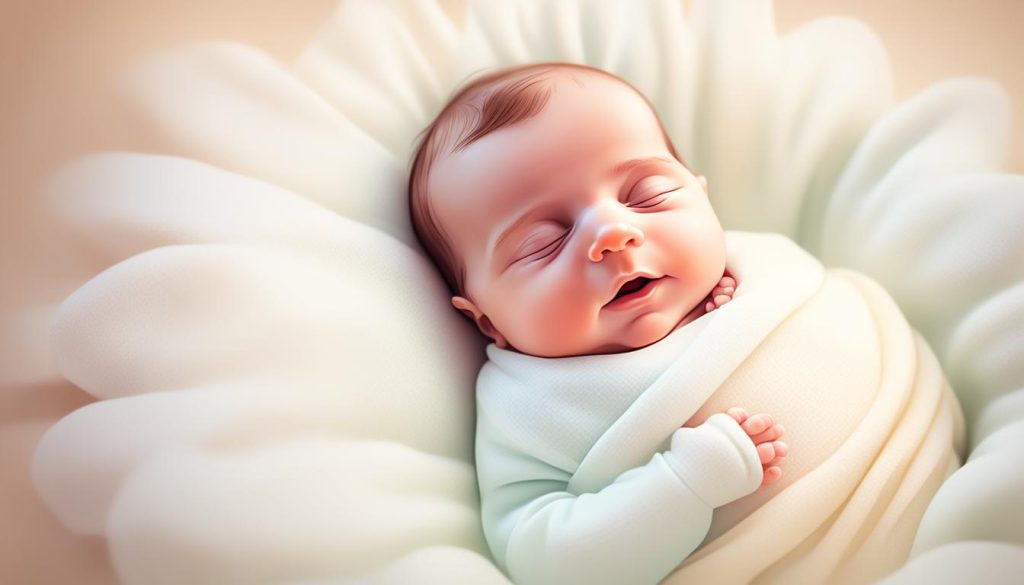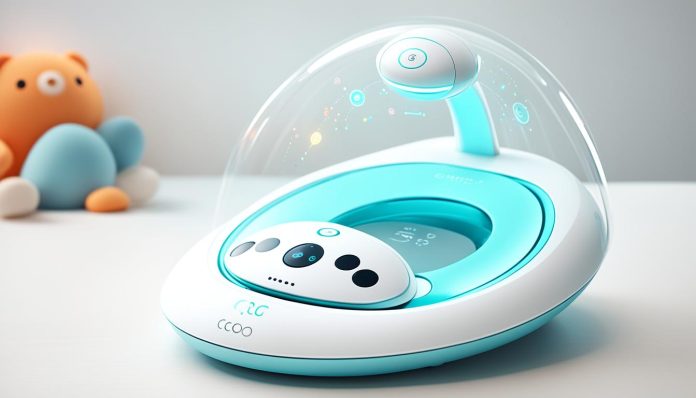Welcome to ChillaxCare, where we believe that modern parenting should be a seamless and enjoyable experience. As parents ourselves, we understand the challenges and concerns that come with raising children in today’s fast-paced world. That’s why we’ve created cutting-edge parenting tech solutions that are designed to make your life easier and your child’s development a breeze.
At ChillaxCare, we’re passionate about revolutionizing the way modern families approach parenting. We combine the latest technologies with a deep understanding of parenting needs to develop innovative solutions that enhance your parenting experience.
Visit chillaxcare.com to explore our range of products and discover how our innovative tech solutions can transform your parenting journey.
Key Takeaways:
- ChillaxCare offers cutting-edge parenting tech solutions to make parenting easier and more enjoyable.
- Visit chillaxcare.com to explore the range of innovative products.
- ChillaxCare’s goal is to revolutionize the way modern families approach parenting.
Advanced Baby Monitoring with the Chillax Giraffe Cam Pro
The Chillax Giraffe Cam Pro is a state-of-the-art baby monitoring system that ensures the safety of your little one while providing parents with peace of mind. With its advanced features and cutting-edge technology, this monitor sets a new standard in baby monitoring.
One standout feature of the Chillax Giraffe Cam Pro is its low EMF emissions. EMF, or electromagnetic field, is a form of radiation that is emitted by electronic devices. High EMF levels have raised concerns among parents regarding potential health risks.
However, with the Chillax Giraffe Cam Pro, you can rest assured that your baby is protected from excessive EMF exposure. This monitor is designed with low EMF emissions, making it a safe option for your little one’s nursery.
Not only does the Chillax Giraffe Cam Pro prioritize safety, but it also excels in delivering crystal-clear audio and video features. With its high-definition camera and sensitive microphone, you can have a clear view and hear every precious sound your baby makes.
The Chillax Giraffe Cam Pro comes equipped with night vision capabilities, allowing you to monitor your baby even in low light conditions. Whether it’s during the daytime or in the middle of the night, this monitor ensures that you can always keep an eye on your little one.
“I love the Chillax Giraffe Cam Pro! It provides me with a sense of security knowing that I can see and hear my baby at all times. The low EMF emissions are a huge plus for me as I prioritize my baby’s health. I highly recommend this advanced baby monitor to all parents!” – Emily C.
Investing in a reliable and technologically advanced baby monitor like the Chillax Giraffe Cam Pro can greatly enhance your parenting experience. With its exceptional features and focus on safety, this monitor offers convenience, peace of mind, and the ability to stay connected with your baby.
Experience the future of baby monitoring with the Chillax Giraffe Cam Pro!
Key Features of the Chillax Giraffe Cam Pro:
- Low EMF emissions for your baby’s safety
- Crystal-clear audio and video features
- Night vision capabilities for monitoring in low light
- Easy-to-use and intuitive interface
- Secure and reliable connection
Can Babies Sense Pregnancy Before You Know? Exploring the Science
It’s a question that has fascinated many expectant mothers: Can babies sense pregnancy before you know? While it may seem like an intuitive connection, scientific research has shed some light on this intriguing topic.
Studies have shown that babies may indeed exhibit subtle signs of awareness when a woman is pregnant. These signs can manifest in various ways, providing a glimpse into the special bond between mother and child even before birth.
Signs of Awareness
One of the most common signs that babies might sense pregnancy before you know is changes in their behavior. Many mothers have reported noticing that their infants become more clingy or affectionate towards them during pregnancy, seeking more physical contact or showing a greater preference for being held.
Additionally, some babies may display heightened sensitivity to their mother’s emotional state. They may exhibit increased fussiness or show signs of being more alert and attentive whenever their mother is experiencing strong emotions, such as joy, excitement, or stress.
“My baby would constantly kick and move around whenever I felt happy or anxious during my pregnancy. It was as if he could sense my emotions even before I could fully understand them myself.”
Another intriguing aspect is the possibility that babies can pick up on hormonal changes in the mother’s body. The fluctuations in hormone levels that occur during pregnancy may emit subtle scents or chemical signals that newborns can detect, leading to a sense of familiarity and comfort.
The Science Behind It
While the exact mechanisms behind babies sensing pregnancy before you know are not fully understood, researchers believe that these remarkable abilities stem from a combination of factors.
One theory suggests that newborns may detect changes in their mother’s body language, facial expressions, or tone of voice. Babies are highly perceptive to visual and auditory cues, and they can quickly learn to associate these changes with the presence of pregnancy.
Another possibility is that babies possess a heightened sense of smell, allowing them to pick up on subtle scents produced by the mother’s body during pregnancy. This enhanced olfactory sense could enable newborns to recognize familiar odors and create a sense of connection even before birth.
Signs Babies Might Display When a Woman is Pregnant
| Signs of Awareness | Description |
|---|---|
| Increased Clinginess or Affection | Babies seek more physical contact and show a preference for being held. |
| Sensitivity to Emotional State | Babies may become more fussy or alert in response to their mother’s strong emotions. |
| Heightened Sense of Smell | Babies may detect subtle scents or chemical signals associated with pregnancy. |
While more research is needed to fully understand the complexities of this phenomenon, the evidence suggests that babies have an innate ability to detect and respond to their mother’s pregnancy. The bond between a mother and her child is truly remarkable and begins long before birth.
Understanding Infant Sleep: Tips for Establishing Healthy Sleep Habits
Establishing healthy sleep habits in infants is crucial for their development. Adequate and restful sleep helps babies grow, learn, and thrive. In this section, we will discuss effective strategies for helping babies sleep through the night, including the popular Ferber method. We will also address common questions related to infant sleep, such as sneezing in the womb and whether babies can sense early pregnancy.
1. The Importance of a Consistent Sleep Schedule
Creating a consistent sleep schedule for your baby can help regulate their internal body clock, leading to improved sleep patterns. Aim to establish regular nap times and a bedtime routine, such as a bath, soothing activities, and a calm environment. Consistency and predictability can provide a sense of security and signal to your baby that it’s time to sleep.
2. Implementing the Ferber Method
The Ferber method, also known as graduated extinction, is a sleep training approach that involves gradually increasing intervals of allowing your baby to self-soothe and fall asleep independently. This method can help babies learn how to soothe themselves back to sleep when they wake up during the night. Remember, every baby is unique, and it’s important to consider your baby’s age and individual needs before starting any sleep training method.
“The Ferber method helped us teach our baby to fall asleep on her own. It was a bit challenging at first, but now she sleeps through the night, giving us much-needed rest as well.” – Sarah, a satisfied parent
It’s important to note that the Ferber method may not be suitable for every family, and there are various other sleep training approaches available that you can explore. Consulting with your pediatrician or a sleep specialist can help you determine the best approach for your baby.
3. Common Infant Sleep Questions Answered
During the early stages, many parents have questions and concerns about infant sleep. Let’s address a couple of frequent queries:
- Can babies sneeze in the womb? While babies do practice breathing movements in the womb, sneezing typically occurs after birth as a reflex response to clear any irritants from the nasal passages.
- Can babies sense early pregnancy? While research on this topic is limited, some studies suggest that babies may be able to detect changes in their mother’s body, such as hormonal fluctuations. However, further research is needed to fully understand this phenomenon.
Baby Sleep Schedule by Age
Understanding age-appropriate sleep patterns can help guide your expectations and ensure you’re providing the right environment for your baby’s sleep. Here’s a general guide to baby sleep schedules by age:
| Age | Naps per Day | Total Sleep per Day |
|---|---|---|
| Newborn (0-3 months) | Varies | 14-17 hours |
| 3-6 months | 3-4 | 12-15 hours |
| 6-9 months | 2-3 | 12-15 hours |
| 9-12 months | 2 | 12-14 hours |
Remember, every baby is unique, and these sleep schedules serve as general guidelines. Your baby’s sleep needs may vary slightly.
By following these tips and incorporating healthy sleep practices into your baby’s routine, you can support their overall well-being and create a calm and restful environment for both you and your little one.
The Toddler Spinning Phenomenon: Exploring Possible Reasons
Many parents observe their toddlers spinning in circles and wonder about the reasons behind this behavior. While it may seem strange or even concerning, there are actually various factors that can contribute to a toddler’s inclination to spin in circles. In this section, we’ll explore some possible explanations for the toddler spinning phenomenon, shedding light on developmental, sensory, and cognitive factors that may play a role.
Toddler Development and Motor Skills
One of the primary reasons toddlers spin in circles is related to their development and motor skills. Spinning can be a way for toddlers to explore their physical abilities and test their coordination. It helps them gain a better understanding of their body’s movement in space.
Additionally, spinning activates the vestibular system, which is responsible for balance and spatial orientation. By spinning, toddlers stimulate this system, which can contribute to their overall development and sense of body awareness.
Sensory Stimulation and Self-Soothing
Another possible reason for toddler spinning is sensory stimulation. Spinning can provide a sensory input that some toddlers find enjoyable or soothing. The feeling of movement and the sensory feedback it provides can be calming and comforting for certain children.
It’s important to note that spinning can also be a form of self-stimulation. Some toddlers engage in repetitive spinning as a way to self-regulate and cope with overwhelming emotions or sensory experiences. It can serve as a self-soothing mechanism in certain situations.
Cognitive Exploration and Curiosity
Toddlers are naturally curious beings, and spinning can be a form of cognitive exploration. As they spin, toddlers observe changes in their environment, such as blurred vision or shifting perspectives. This cognitive experimentation allows them to learn about cause and effect, develop spatial awareness, and engage with their surroundings in a new way.
Nurturing Creativity and Imagination
Spinning in circles can also be a manifestation of a toddler’s creativity and imagination. Some children engage in spinning as part of their imaginative play, pretending to be dancers or superheroes whirling through space. It’s a way for them to bring their fantasies to life and express their vibrant imagination.
As parents, it’s important to observe and understand our toddlers’ spinning behavior in the appropriate context. While occasional spinning is typically harmless and a natural part of development, excessive spinning or spinning that interferes with everyday activities may warrant further evaluation or consultation with a healthcare professional.
Remember, every child is unique, and what might be typical behavior for one toddler may differ for another. By providing a safe environment for exploration, promoting healthy sensory experiences, and encouraging imaginative play, you can support your toddler’s development while safely navigating the spinning phenomenon.
| Possible Reasons for Toddler Spinning | Explanations |
|---|---|
| Toddler Development and Motor Skills | Spinning helps toddlers explore their physical abilities and stimulates the vestibular system responsible for balance and spatial orientation. |
| Sensory Stimulation and Self-Soothing | Spinning provides sensory input that some toddlers find enjoyable or soothing, serving as a self-stimulation mechanism and a way to cope with overwhelming emotions or sensory experiences. |
| Cognitive Exploration and Curiosity | Toddlers engage in spinning as a form of cognitive exploration, observing changes in their environment and developing spatial awareness. |
| Nurturing Creativity and Imagination | Toddlers may spin as part of imaginative play, expressing their creativity and pretending to be dancers or superheroes. |
Understanding the reasons behind toddler spinning can help parents navigate this behavior with patience and support. By embracing their curiosity, promoting safe exploration, and providing nurturing environments, we can contribute to our toddlers’ healthy development and overall well-being.

Pregnancy and Self-Care: The Safe and Soothing Benefits of Ice Baths and Hot Chocolate
Pregnancy is a time when self-care becomes crucial. As an expectant mother, it’s important to prioritize your well-being and find safe and comforting ways to relax and unwind. In this section, we explore two delightful practices that can contribute to your overall physical and mental health during pregnancy: indulging in ice baths and enjoying a cup of hot chocolate or chai tea.
The Benefits of Ice Baths
An ice bath, also known as cold water immersion therapy, involves submerging your body in cold water for a short period. While pregnant, it’s important to prioritize your safety, so let’s address the common question: Are ice baths safe while pregnant? The answer is yes, but there are a few precautions to keep in mind.
Ice baths, when done correctly, can help reduce swelling, alleviate muscle soreness, and provide a refreshing sensation. The cold water promotes blood circulation, which can have numerous benefits, including reducing inflammation and easing discomfort from the extra weight of pregnancy.
Here are some tips for enjoying a safe and soothing ice bath while pregnant:
- Consult with your healthcare provider before incorporating ice baths into your routine.
- Keep the water temperature at a moderately cold level, around 50 to 60 degrees Fahrenheit (10 to 15 degrees Celsius).
- Avoid staying in the ice bath for prolonged periods; limit the duration to 5 to 10 minutes.
- Listen to your body and discontinue the ice bath if you feel any discomfort or dizziness.
The Comfort of Hot Chocolate and Chai Tea
Indulging in a warm cup of hot chocolate or chai tea can be a delight during pregnancy. These cozy beverages offer a range of comforting benefits, both physically and emotionally. However, it’s crucial to consider the caffeine and sugar content when consuming them.
Can I drink hot chocolate while pregnant? Definitely! Hot chocolate is generally considered safe during pregnancy, especially if it’s made with minimal amounts of added sugar. Opt for high-quality dark chocolate and use a natural sweetener like honey or maple syrup.
Is chai tea safe during pregnancy? Yes, but be mindful of the ingredients. Traditional chai tea may contain black tea, which contains caffeine. However, you can enjoy decaffeinated or herbal blended chai teas as a delightful caffeine-free alternative.
When preparing these beverages, consider using organic ingredients and reducing the amount of sugar. You can also explore creative variations by adding spices like cinnamon or relaxing herbs like chamomile.
Remember, moderation is key. It’s important to savor these warm beverages as part of a balanced and nutritious diet during pregnancy.
Newborns and the Intuitive Connection to Pregnancy
Newborns and infants have an incredible ability to sense and react to the presence of pregnancy in women. It’s a fascinating phenomenon that highlights the unique bond between babies and their expectant mothers. While research is still uncovering the intricacies of this intuitive connection, there are several signs that indicate a baby might be aware of a woman’s pregnancy.
Sensitive to Changes
Newborns are highly perceptive and can pick up on changes in their environment, including physical and hormonal shifts that occur during pregnancy. They may become more alert, attentive, or exhibit changes in behavior when in close proximity to a pregnant woman. This heightened awareness could be their way of responding to the changes they sense in their mother’s body.
Connection Through Scent
Babies have a keen sense of smell, and studies suggest that they can detect the unique scent of a pregnant woman. Hormonal changes during pregnancy can alter a woman’s scent profile, and newborns may respond to this olfactory cue. Their ability to recognize and differentiate scents serves as another indicator of their intuitive connection to pregnancy.
“I noticed that my newborn son became more calm and content whenever he was near me during my pregnancy. It almost felt like he could sense something different about me.” – Emily, mother of one
Bonding Through Touch
Physical contact plays a vital role in newborn development, and it can strengthen the bond between a baby and their pregnant mother. Babies may react to the warmth and closeness they feel during skin-to-skin contact, creating a stronger connection to the pregnancy. The soothing effect of touch can contribute to a sense of security and comfort for both the baby and the expectant mother.
Emotional Sensitivity
Infants often display emotional sensitivity and can pick up on the emotional changes experienced by their mothers during pregnancy. They may react to changes in their mother’s mood, stress levels, or overall emotional well-being. This emotional connection further reinforces the intuitive nature of newborns and their ability to sense pregnancy.

In summary, newborns and infants possess a remarkable ability to sense and react to the presence of pregnancy. Through heightened awareness, olfactory cues, physical touch, and emotional sensitivity, they form an intuitive connection to their expectant mothers. It highlights the profound bond between a baby and their mother, even before birth.
Dressing Your Baby: Understanding Clothing Sizes and Growth
Dressing your baby appropriately is essential for their comfort and development. Understanding clothing sizes and how long babies typically wear newborn clothes can help ensure a perfect fit. Additionally, there’s a fascinating question to explore: Can babies sense a woman’s pregnancy?
Understanding Clothing Sizes
When it comes to dressing your baby, it’s important to understand clothing sizes to ensure a proper fit. The size of newborn clothes can vary based on different factors, including the brand and your baby’s individual growth. Here’s a general guideline:
| Size | Approximate Age Range | Weight |
|---|---|---|
| Newborn | Up to 1 month | Up to 8 pounds (3.6 kg) |
| 0-3 months | 1-3 months | 8-12 pounds (3.6-5.4 kg) |
| 3-6 months | 3-6 months | 12-16 pounds (5.4-7.3 kg) |
| 6-9 months | 6-9 months | 16-20 pounds (7.3-9.1 kg) |
| 9-12 months | 9-12 months | 20-24 pounds (9.1-10.9 kg) |
Keep in mind that these are only general guidelines, and it’s important to consider your baby’s individual growth and development. Babies grow at different rates, so it’s crucial to monitor their clothing fit regularly and adjust accordingly.
Can Babies Sense a Woman’s Pregnancy?
One intriguing question that many parents wonder about is whether babies can sense a woman’s pregnancy. While there is limited scientific research on this topic, some anecdotal evidence suggests that babies may be able to pick up on subtle cues.
Babies are remarkably perceptive and sensitive to changes in their environment, including changes in their mother’s body. They may notice hormonal changes, fluctuations in scent, and even changes in their mother’s emotions. However, it’s important to note that every baby is different, and not all babies may show signs of sensing pregnancy.
Some common signs that a baby might sense a woman’s pregnancy include:
- Increased clinginess or need for physical contact with the pregnant woman
- Heightened curiosity about the pregnant woman’s belly
- Changes in behavior or mood, such as becoming more affectionate or protective
- Reacting to the sound of the unborn baby’s heartbeat or movements
Ultimately, the ability of a baby to sense pregnancy is still a topic of ongoing research and is not fully understood. However, it can be a fascinating aspect to observe and discuss as parents.
Conclusion
This article has delved into ChillaxCare’s innovative parenting tech solutions, providing valuable insights into various topics related to pregnancy and parenting. From the advanced baby monitoring system offered by the Chillax Giraffe Cam Pro to the intriguing abilities of newborns and toddlers, we have covered a wide range of important information.
ChillaxCare is revolutionizing the way modern families approach parenting with their cutting-edge technologies. Their low EMF emissions baby monitor, the Chillax Giraffe Cam Pro, ensures your baby’s safety while providing crystal-clear audio and video features. This innovative solution offers peace of mind to parents.
Furthermore, we have explored the fascinating connections between pregnancy and child behavior. Newborns and infants seem to have an intuitive connection to pregnancy, displaying signs that indicate their awareness of a woman’s pregnancy. Dressing your baby appropriately is also crucial for their comfort and growth, and we have provided guidance on understanding clothing sizes and how long newborn clothes typically fit.
By taking advantage of ChillaxCare’s parenting tech solutions and gaining insights into pregnancy and child behavior, modern families can enhance their parenting experience and ensure the well-being of their little ones.
FAQ
Can babies sense pregnancy before you know?
While there is no scientific evidence to support this claim, some anecdotal stories suggest that babies may exhibit certain behaviors that could be interpreted as sensing pregnancy. However, it is important to note that every baby is different, and these behaviors may have other explanations.
How can babies tell if you’re pregnant?
Babies do not have the cognitive ability to directly sense pregnancy. However, they may pick up on physical cues and changes in their mother’s body, such as hormonal fluctuations and changes in her scent or behavior.
Why do toddlers spin in circles?
Toddlers spinning in circles is a common behavior observed in many children. It could be a way for them to explore their environment, regulate sensory input, or simply enjoy the feeling of spinning.
Can I drink hot chocolate while pregnant?
In moderation, hot chocolate is generally considered safe during pregnancy. However, it is important to limit caffeine intake and choose hot chocolate made with pasteurized milk to reduce the risk of potential harm to both you and your baby.
Can newborns sense pregnancy?
While newborns may not be able to consciously sense pregnancy, they may show subtle reactions to the changes in their mother’s body, such as increased alertness or changes in feeding patterns. However, these reactions could have other explanations as well.
How long do babies wear newborn clothes?
On average, babies wear newborn clothes for about one to three months, depending on their growth rate. It is essential to monitor your baby’s growth and transition them into larger sizes as they outgrow their newborn clothes.
Are ice baths safe while pregnant?
It is generally not recommended to take ice baths while pregnant, as exposure to extremely cold temperatures can pose risks to both you and your baby. It is advisable to consult with your healthcare provider before engaging in any activities that involve significant temperature changes.
Can babies tell when you’re pregnant?
Babies do not possess the ability to understand pregnancy in the traditional sense. However, they may react to changes in their mother’s body and behavior, which could be perceived as an awareness of pregnancy.
Why does my 2-year-old spin in circles?
Toddlers spinning in circles is often a self-soothing or self-stimulating behavior. It can also be a way for them to explore balance and coordination. If the spinning becomes excessive or interferes with daily activities, seeking guidance from a pediatrician may be beneficial.
Is chai tea safe during pregnancy?
Chai tea typically contains caffeine and certain spices, such as cinnamon and cloves, which may not be suitable for pregnant women in large amounts. It is best to consult with your healthcare provider to ensure the safety of consuming chai tea during pregnancy.
Can babies sense when their mother is pregnant?
While there is no scientific evidence to support this claim, some mothers report that their babies exhibit changes in behavior or show increased bonding towards their pregnant mother. However, it is essential to consider that each baby’s response may vary.





